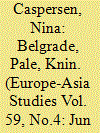| Srl | Item |
| 1 |
ID:
077780


|
|
|
|
|
| Publication |
2007.
|
| Summary/Abstract |
The importance of kin-state involvement in ethnic conflicts and wars is often recognised in the literature, yet little theorising exists. This article analyses the links between the Serbian regime and the Serb leaders in Croatia and Bosnia during the Yugoslav war. Contrary to widespread assumptions, it finds that Slobodan Milosevic was not always able to control local developments; the local Serb leaders became increasingly rebellious and possessed means for limiting Belgrade's influence. Instead of assuming static ethnic solidarities, the analysis focuses on intra-ethnic divisions and the supply of resources and is thereby able to capture the fluidity of kin-state relations and the potentially limited longevity of such ties. It shows that links between a kin-state and its ethnic brethren may be weakened despite the existence of extreme insecurity
|
|
|
|
|
|
|
|
|
|
|
|
|
|
|
|
| 2 |
ID:
077781


|
|
|
|
|
| Publication |
2007.
|
| Summary/Abstract |
Conflict characterised Russian elite politics during the Yel'tsin years. This article adopts a network approach to understand the sources of elite contention in one Russian locality between 1994 and 2000. The findings suggest that elite conflict during the Yel'tsin years had its roots in structural and cultural forces deeper than control over official positions and differences in socio-demographic characteristics. The article reveals that elites fragmented over time into factions. Rather than having a unifying culture, elites from different factions held distinct worldviews that were patterned by their networks. The characteristics of their worldviews matched the structural properties of elite factions and reinforced differences between them
|
|
|
|
|
|
|
|
|
|
|
|
|
|
|
|
| 3 |
ID:
077778


|
|
|
| 4 |
ID:
077777


|
|
|
|
|
| Publication |
2007.
|
| Summary/Abstract |
This article gauges how plausible deep historical explanations are in accounting for the emergence of particular types of parties in post-communist Poland, Hungary, and the Czech Republic. Generating and testing hypotheses from the centuries-long historical logic of Lipset and Rokkan's model of cleavage and party development, it finds that the historical foundations of post-communist parties may be deeper than most analyses assume and that the influence of the communist era may be less than is often believed. While a full understanding of the emergence of post-communist party types requires both historical and non-historical explanations, historical ones should not be underestimated
|
|
|
|
|
|
|
|
|
|
|
|
|
|
|
|
| 5 |
ID:
077779


|
|
|
|
|
| Publication |
2007.
|
| Summary/Abstract |
This article attempts to apply major ideas developed in Anglo-American 'network analysis' to enlarge geographical constructions of the rural 'problematic' in Russia. It interrogates complex understandings of 'poor people' via a study of social networks in two villages in Central European Russia, focusing on connections between different actors embedded in social contexts in the countryside, different forms of associations between rural people, and the ways in which specific forms of their interrelations affect poverty. In so doing, the article attempts to reconnect different positions of rural people in Russia and different transitory aspects of 'poor' identities (i.e. of people in poverty), as well as to broaden understanding of differentiated experiences of rural poverty.
|
|
|
|
|
|
|
|
|
|
|
|
|
|
|
|